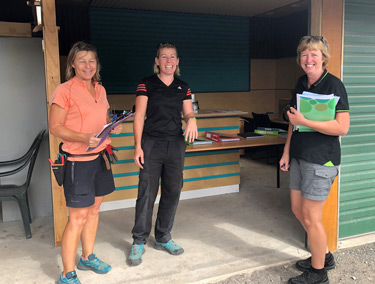Protecting our nurseries and industry from biosecurity hazards
Scheme documents updated1 July 2021
20 February 2020 Work with nurseries through 2019’s pilot programme provided valuable feedback for improvements to the PPBS. These have been implemented, and major changes include:
PPBS Update – February 202020 February 2020 It has been a busy 12 months for team working on the Plant Production Biosecurity Scheme (PPBS) - NZPPI, Biosecurity New Zealand, the Department of Conservation, and other industry partners. Now that we have had a chance to catch our breath, we would like to update you on some of the work that took place on the scheme in 2019, and what is in store for the year ahead. As usual, if you have any questions about the scheme or would like more information, please don’t hesitate to contact the PPBS project lead, John Liddle. Feedback from pilot improves scheme In February 2019, the pilot programme for the Plant Production Biosecurity Scheme began in 19 nurseries throughout the country. The pilot programme and the feedback from participating nurseries has helped us to improve and refine the scheme before it is rolled-out more widely later in the year. Thank you to the participating nurseries. The worked hard and provided valuable insights and feedback. This has helped to make the scheme more relevant and workable for other participants. Eight of the nurseries that took part in the pilot programme are now fully certified under the PPBS. The other nurseries that took part in the pilot are continuing to build and refine their systems to meet the scheme requirements. We expect they will achieve certification soon. The pilot programme ran from February to September 2019. The participating nurseries attended workshops, worked on their systems and were audited by AsureQuality. Feedback from the audit gave the nurseries the opportunity to improve their systems and practices in areas where they didn’t conform with the scheme. Nurseries achieve PPBS certification Congratulations to the eight plant producers who became certified during the Plant Production Biosecurity Scheme pilot programme in 2019. Seeing these nurseries successfully come through the programme was a highlight for the PPBS project last year. The eight nurseries are:
The feedback we received from these nurseries shows the value they’re getting from being certified under the PPBS. Kat Scott from Base Nurseries says being certified has led to more business. “The PPBS has created a benchmark that keeps nursery standards high, which in turn produces higher quality plants. Through the process we found areas for improvement that we had not seen or thought of before. It’s been a real benefit.” Zealandia Horticulture’s Molly Shaw says biosecurity is one of the most important challenges facing the green industry. “It’s been a challenge and sometimes frustrating to apply a certification scheme that’s been designed for the industry’s diverse range of producers. However, we’ve worked to help refine the scheme, while using the experience to revisit and improve our own biosecurity habits and practices.” Bec Stanley from Auckland Botanic Gardens (ABG) says certification gives her confidence the business is in the best position to ensure pests don’t impact on the nursery and its planting sites. “The nursery produces 65,000 native plants each year for habitat restoration in parks. We also propagate threatened plants for conservation projects. It’s crucial that pests, weeds and diseases are not spread to wild sites with our plants. The nursery manual we compiled for the PPBS includes practices to ensure the risk of pest and diseases coming into or leaving the ABG nursery are minimised. It’s been a process where we have all learned so much and look forward to sharing our journey and continuing to improve our biosecurity hygiene.” Joanne Austin, Compliance Coordinator from Riversun Nursery says the PPBS has given them the opportunity to further improve the systems already in place. She says it connects well with the certification standards that Riversun already has. “The new PPBS will encourage healthy industry growth, encourage consumer and client awareness of biosecurity threats, while protecting our industry.” The team at Lyndale Nurseries used the pilot programme and audit to test their procedures against an industry benchmark. Malcolm Woolmore says Lyndale had already achieved accreditation under the Nursery Industry Accreditation Scheme Australia (NIASA). However, they saw the advantage of a New Zealand specific scheme that reflects the unique biosecurity issues that are faced by local production nurseries. “Importantly, we rely on the free movement of plant material around the country, and anything that we can do to protect this situation is ‘money in the bank’ for us. I see a biosecurity-led shut down of plant movements as a real business risk, and certification will help us withstand such a situation should it arise.” What does 2020 have in store for the PPBS? The project team is working towards a wider roll-out of the PPBS later in the year. Our priorities before then include:
Why nurseries should get involved22 August 2019 "It would be great if more nurseries joined (the PPBS) as the biggest kaupapa for us is not just the business but to reduce risk to the environment" said Merania Kerehoma of Ngāti Whātua Orākei when asked of her work in the Scheme's pilot programme. Other nurseries taking part in the pilot programme report healthier plants, improved customer satisfaction and more streamlined systems are just some of the many benefits of the new Plant Producers Biosecurity Scheme. The nursery managers involved are recommending that others also sign up to the PPBS. Read about why they recommend the scheme, their experiences of introducing the requirements and the feedback they received from staff and customers.
Biosecurity scheme - pilot nursery feedback20 June 2019 This year, twenty nurseries are testing 2018’s PPBS design work through a nursery and audit pilots. Diane and John Coleman’s Treeline Native Nursery is one of these. They grow native plants for a wide range of revegetation, restoration and development projects. Their customers include regional councils, DOC, farmers and developers and private gardeners. “Having a biosecurity scheme within the horticulture sector is paramount to establishing standards and guidelines that we all follow to protect our places of work, establish confidence between individual businesses, and to future proofing”, so says Debbie Porter who’s running the pilot programme at Treeline … more
Biosecurity scheme – pilot results are in, nurseries working on compliance with strong feedback on scheme usability20 June 2019 The nursery and audit pilot programme has been a major focus over the last few months. Twenty nurseries have been field testing last year’s design work providing valuable insight and highly constructive feedback on the scheme’s application and usability. Nurseries began with a self-assessment against the checklist and a workshop to kick off the pilot and audit process. Asure Quality have completed their round of nursery visits and audits. Nurseries are now working through their audit report undertaking corrective actions to meet standard certification requirements. Several nurseries are certification-ready in accordance with the current draft scheme rules, while many are highly likely to be ready by the end of the pilot programme. Audits have shown that documentation is the greatest challenge for many. In many cases, procedures were being undertaken as a matter of routine; written procedures and records of inspections and nursery activity were lacking. There was a lessor number of instances of poor practice being encountered. Based on nursery Asure Quality feedback the audit process appeared to go smoothly. Feedback from pilot nurseries on the audit process has been strongly positive. Pilot and audit feedback includes good suggestions for standard and checklist refinements, none of which currently appears to require substantive change, but improve usability, resolve interpretive matters and increase efficiency and relevancy. Early insights into the draft scheme’s fitness for purpose include:
Pilot audits underway24 April 2019 Development of the Plant Production Biosecurity scheme (PPBS) has taken another positive step forward with nineteen nurseries undergoing pilot audits against the draft standard. The pilot nurseries cover a wide spectrum of nursery types, size, species, markets and supply chains, production methods and include community and iwi/hapū based nurseries. This is part of our commitment to ensure that the standard is relevant to all nurseries. Early feedback from the pilot audits has been positive. The participating nurseries are enthusiastic about the process and are providing strong insight into things we can improve in the scheme. We anticipate the full launch of the PPBS programme to all of industry later this year. Other current PPBS work includes the development of best practice and guidance, comms and stakeholder engagement, a module for Phytophthora and Kauri Dieback, a plant buyer’s accord, traceability, scheme operations and infrastructure development, and regulatory options. We would like to acknowledge and thank the nurseries that are participating in the pilot audits:
Kara Beaumont, from Ardmore Nurseries, said: "Vol, our auditor, was very practical in her approach and was able to suggest simple approaches that would cover off a few risks or areas at the same time. “We were harder on ourselves in our self-assessment than she was on us on the day. There were some areas where we weren't confident that we met the requirements of the Core Standard, but Vol helped us think more laterally and realise that either we were meeting the requirements in a less obvious way, or that we could do so through some minor changes that are consistent with our current processes. “It would be impossible to write the Core Standard in a way that every nursery can see how it fits into their processes immediately. The auditors are a useful bridge between the Standard and the management systems of each individual nursery." If you’d like to know more, talk with project lead John Liddle, 021 370 168, john@nzppi.co.nz. |
Project Update
February 2019
It’s been startling to see how fast the Plant Producers Biosecurity Scheme (PPBS) has come together over the past year.
The draft standard has been written and is now ready to trial in nurseries. In the early part of 2019, we will run some pilot audits in 10 nurseries.
The PPBS is a biosecurity management scheme for the New Zealand nursery industry. It has been developed by MPI and the horticulture industry to improve plant hygiene practices in the sector.
It includes a general hygiene standard for all nurseries and species, plus add on modules for myrtle rust and kauri dieback.
The programme will be ready for launch mid-year.
Building a scheme like this is not easy. It has been an all-in effort by MPI and industry bodies to get it to this stage.
The scheme applies to any type of nursery. That’s why the initial part of the work took so long. The sector is diverse and complex so bringing everyone on board and getting the foundations in place has been a significant task.
Now we are getting closer to launch date, over the next few weeks, nurseries will start to see more information about the scheme.
The PPBS is for all nurseries across all sectors, big and small, not-for-profit and commercial.
This is a collaborative project that has been driven by MPI and NZPPI. But it has been supported by the horticulture and forestry sectors.
We are proud of what has been achieved.
We would like to thank everyone that has been involved, including those of you that attended the workshops, participated in the working group and provided feedback.
Plant production biosecurity scheme consultation overview
August 2018
The top themes that emerged from the PPBS June/July consultation were:
- Strong support for the objectives – protecting industry, producers, their customers and the environment
- It must benefit producers and result in less ‘red tape’
- Strong need for MPI recognition and support
- Need to engage all plant producers in the standard/registration.
Thank you to all those (around 120) who gave their time to demonstrate their interest in the scheme and commitment to the industry.
NZPPI has strong support for its work to improve industry biosecurity risk management and preparedness, and work to prevent producers and industry being beset by a biosecurity event.
Your feedback also provided strong leads on how to improve the draft proposals and helped identify some of the gaps and new opportunities in our work to date.
A summary of the feedback - and what we’ve done, or will do, in response - can be downloaded here.
Work is underway on the scheme design and associated standards. This work includes developing a pilot programme among nurseries to field test the proposed scheme as it evolves.
We’re still open to feedback on design issues – please contact us with your ideas and feedback to john@nzppi.co.nz
Consultation on the proposed plant production biosecurity scheme
June 2018
New Zealand plant producers are driving development of an industry biosecurity scheme to detect pests and pathogens and prevent their spread.
In November 2017, MPI commissioned New Zealand Plant Producers Incorporated (NZPPI) to lead development of the scheme, placing plant producers at the forefront of New Zealand’s biosecurity efforts.
Over the past six months, an NZPPI team has worked with industry members, MPI and other stakeholders to design a plant production biosecurity standard and manual.
The proposal is now ready for industry consultation and feedback.
- Scheme introduction
- Other consultation and scheme proposal documents – see top of centre column
We seek your feedback on the design proposal, and several specific issues, on or before Friday 6 July.
Industry Meetings
This month we’ll host several meetings for industry members to gather and provide feedback. Our team is keen to understand your thoughts about the proposed Scheme and collaborate with you to develop a common sense, workable solution.
Please join us on:
- 11 June – Christchurch, Antarctic Centre
- 13 June – Auckland, Quality Hotel Lincoln Green
- 14 June – Tauranga, Hotel Armitage
- 19 June – Dunedin, Airport Conference Centre
- 20 June – Nelson, Grand Mercure Monaco Resort
- 21 June – Palmerston North, Awapuni Function Centre
All meetings run from 11am to 3pm and include a light lunch. Please RSVP to Frances Palmer, frances@nzppi.co.nz.
More details from Matt Dolan (027 622 9255), matthew@nzppi.co.nz) or John Liddle (021 370 168, john@nzppi.co.nz).
12/5/18
NZPPI work on developing plant production biosecurity scheme well underway
Experience early in the myrtle rust response underscored the crucial role that plant producers play in early detection and slowing the spread following a pest incursion. Subsequent discussions identified the opportunity to develop a systematic approach to plant production industry biosecurity risk management. Late in 2017, and under the auspices of the myrtle rust response, MPI contracted NZPPI to design a Plant Production Biosecurity Scheme (PPBS).
The proposed Scheme is intended to increase the awareness among plant producers of the risks that exotic and endemic pests pose to their nursery and grow producers’ adoption of good biosecurity practice to help manage the risk of pest and disease spread. By protecting their nurseries, they also protect customers, the environment and the New Zealand economy.
The Scheme is a step change in producer and industry biosecurity readiness and capability. It will build and broaden industry biosecurity engagement and harness the critical skills and observations that exist in the plant production industry to strengthen biosecurity - and the crucial biosecurity team of 4.7 million New Zealanders. The development of this scheme, and the collaboration among producers, MPI and other plant-based sectors, is a strong illustration of this partnership progressing shared biosecurity interests, further and strongly illustrated through MPI funding for the project.
Scheme design underway
Work on the scheme design and proposal is well underway. To date, it is focused on biosecurity hazards that impact a wide range of producers and nursery types and how we can work together to improve nursery and industry biosecurity risk management. The NZPPI team working on this project is gathering data on:
- biosecurity hazards;
- the ways in which nurseries can prepare to prevent being impacted by these hazards; and
- the ways in which hazards can be managed, or the impacts minimised, should a nursery be infested.
The work to design the scheme has been supported by a research stocktake by Scion and Plant and Food Research (May 2018). The aim of the stocktake (available here) is to support science-based design and provide evidence to inform biosecurity related nursery best practice. As part of the stocktake, a web-based and searchable nursery production biosecurity database will be created, complete with abstracts and links to appropriate reference materials. We’ll bring you more details in the coming weeks and months.
We’re under “increasing pressure from terrestrial and aquatic pests, weeds and diseases that threaten the country's ecosystems and economy”. So said a 2015 research paper – read more about this and our work on the biosecurity scheme here.Industry consultation and meetings
NZPPI expects to have proposals ready for industry consultation and feedback late in May. In June, we’ll host several meetings for industry members to gather and provide feedback so that the team can understand your thoughts about the proposed Scheme and collaborate with you to develop a common sense, workable solution. Please join us on:
- 11 June – Christchurch, Antarctic Centre
- 13 June – Auckland, Quality Hotel Lincoln Green
- 14 June – Tauranga, Hotel Armitage
- 19 June – Dunedin, Airport Conference Centre
- 20 June – Nelson, Grand Mercure Monaco Resort
- 21 June – Palmerston North, Awapuni Function Centre
All meetings run from 11am to 3pm and include a light lunch.
We need your help to build a scheme which works and is workable; focuses on good generic biosecurity practice; reduces the risk of nurseries being infested by high-risk organisms and, in turn, spreading these through plant trade; and, ensures a plant producer is still able to safely grow and move plants around New Zealand.
Keep an eye on NZPPI’s website (www.nzppi.co.nz) for further updates and contact Matt Dolan (027 622 9255, matthew@nzppi.co.nz) or John Liddle (021 370 168, john@nzppi.co.nz) for more information.
12 February 2018
New Zealand plant producers will drive development of an industry biosecurity scheme to detect pests and diseases and prevent their spread.
The Ministry for Primary Industries (MPI) has commissioned the New Zealand Plant Producers Incorporated (NZPPI) to lead development of the scheme, placing plant producers at the forefront of New Zealand’s biosecurity efforts.
Over the next six months, NZPPI will work with industry, MPI and other stakeholders to design a plant production biosecurity standard and manual. This consultative process will determine key considerations such as how the scheme will run and how to upskill industry.
Everyone knows an incursion, depending on the pest in question, would be devastating. We want to know what you would like done to safeguard your livelihood against practices which put all our nursery operations at risk. To that end, a focus group has been formed to help us access a wide variety of views but we will also hold workshops in coming months to ensure plant producers can have questions answered and we can be made aware of any concerns.
The NZPPI team working on this project will seek to understand your thoughts about the scheme and collaborate with you to develop a common sense, workable solution. We want to build a scheme which works and is workable; that focuses on good generic biosecurity practice; reduces the risk of spreading myrtle rust and other high-risk organisms through plant trade; and, ensures a plant producer is still able to safely move plants.
Through the process industry and stakeholders will consider the balance between voluntary or mandatory scheme, which is the best way to achieve the outcomes we desire and how either may operate to the benefit of industry and New Zealand’s biosecurity. At some point later in the year, industry will need to decide whether the scheme will be voluntary or mandatory.
The project recognises the crucial role that plant producers and colleagues in supply chains have in the early detection of new pests and diseases. Plant producers served as New Zealand’s early warning system in last years’ myrtle rust incursion and have proved vital in helping to limit the spread of pests and diseases. The industry’s rapid adoption of NZPPI’s myrtle rust management protocols helped keep plants moving and prevented further rust spread through the supply chain. To date there have been no further infections detected in nurseries or among supply chain members.
Industry’s contribution to the myrtle rust response was applauded by Government. This scheme will further strengthen plant producers’ contribution in keeping New Zealand free of unwanted pests and diseases. It will help with the long-term management of myrtle rust and other high-risk organisms, and support a professional approach to biosecurity across the plant production industry.
The scheme will harness the critical skills, observations and enthusiasm within the industry to complement the work being done to educate the biosecurity team of 4.7 million New Zealanders.
Expected benefits of this project include:
- Greater biosecurity professionalism and standards industry-wide
- Increased likelihood of early detection of myrtle rust and other high-risk organisms
- Minimise domestic spread of myrtle rust and other high-risk organisms
- Preservation of response options in the event of future incursions
- Programmes to help protect producers and their supply chains from pest and disease threats
- Continued safe trade of young plants of known health status
- Continued freedom of movement of young plants to realise economic and environmental benefits to New Zealand.
In the coming months, NZPPI will have more details on the project schedule and how industry members can provide input regarding the design of the scheme.
More details from Matt Dolan (027 622 9255), matthew@nzppi.co.nz) or John Liddle (021 370 168, john@nzppi.co.nz).
Plant Production Biosecurity Scheme
Scheme Documents
1 July 2021.
Scheme documents are now available on the Plant Pass website
https://www.plantpass.org.nz/biosecurity/resources.
PPBS Background
A 2015 publication addressing New Zealand pest management, concluded that "New Zealand is under increasing pressure from terrestrial and aquatic pests, weeds and diseases that threaten the country's ecosystems and economy. Ongoing improvement in existing pest management methodologies and novel approaches are required.” It continued: “Surveillance and pest monitoring are needed to increase the chances of early interception of invasive species or to confirm their eradication"
Plant producers are at the frontline in this battle. New Zealand’s experienced pest incursions in increasing numbers over the last 50 years as international trade and travel have grown. Phytophthora cinnamomi; Pythium and Fusarium species are ubiquitous. New Zealand plant producers manage these, and other endemic pests, daily.
Offshore threats continue to grow, and in the last decade, incursions have occurred in other countries that have had devastating consequences over large areas. Significant exotic pests include Xylella fastidiosa, Ceratocystis fimbriata, Cryphonectria parasitica (Chestnut blight), Phytopthora ramorum (Sudden Oak Death) and Candidatus Liberibacter asiaticus (Citrus greening).
These and others present a critical risk to plant producers, the horticultural industry, the environment and the economy.
The Plant Production Biosecurity Scheme (PPBS) provides a framework to formalise and recognise work plant producers currently undertake to manage pests. It will help them identify, control, manage or avoid pest and biosecurity hazards in their nursery and production processes, protecting the producer, their customers, the environment and the New Zealand economy from the inadvertent introduction and dispersal of a pest.
PPBS Development
The opportunity for a comprehensive biosecurity scheme crystallised through the early stages of 2017’s myrtle rust response where plant producers played a critical role in early detection and lessening the likelihood of myrtle rust being inadvertently spread with nursery stock.
Collaboration among a wide range of industry and biosecurity stakeholders (NZPPI, MPI, DOC, regional councils, Avocado NZ, Forest Owners Association, Kiwifruit Vine Health, NZ Winegrowers, NZ Apples and Pears Vegetables NZ, Summerfruit NZ, Horticulture NZ) provides project oversight and/or funding.
PPBS - why nurseries should get involved
"It would be great if more nurseries joined (the PPBS) as the biggest kaupapa for us is not just the business but to reduce risk to the environment" (Merania Kerehoma of Ngāti Whātua Orākei) ... more
PPBS Case Study Stories
Treeline Native Nursery
Te Rito Gardens
Scott Base Nurseries
Okāhu Rakau Nursery
Minginui Nursery
Growing Spectrum
Auckland Botanic Gardens
Ardmore Nurseries
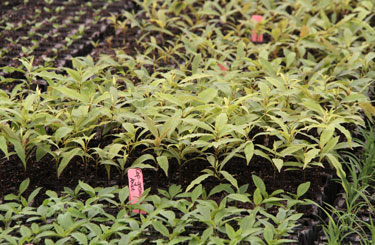
Young nursery stock at Treeline Native Nursery
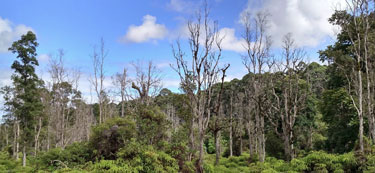
Rapid Ohia Death in Hawaii (photo credit Lisa Keith, USDA-ARS, DKI DKI PBARC, Hilo, Hawaii, presentation at Myrtle Rust Symposium, Auckland, August 2017)
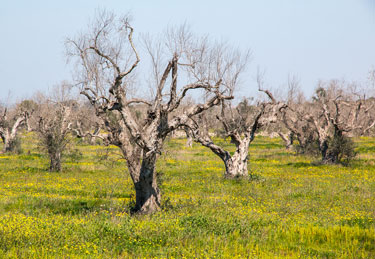
Xylella impacted olive grove Italy (photo credit Shutterstock 610891697)
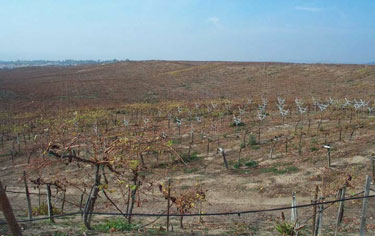
Xylella impacted Vineyard in California (Xylella estimated cost to California wine industry $US104m annually)
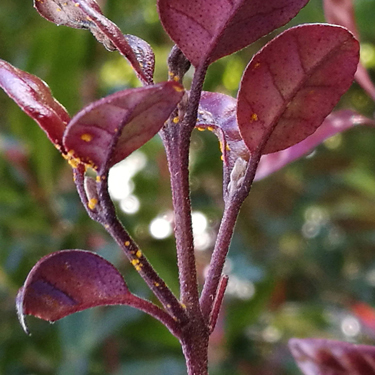
Myrtle Rust symptoms on Lophomyrtus


